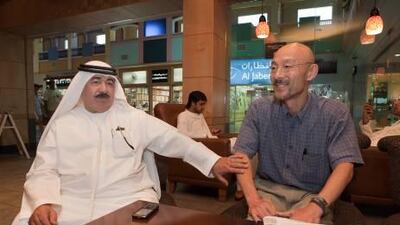RAS AL KHAIMAH // A distinguished Emirati geographer spoke yesterday of his delight at being given Japan's oldest civic honour.
Hamad Mutawah, a former deputy minister of agriculture and fisheries, was awarded the Order of the Rising Sun by the government of Japan for his contribution to the promotion of relations between Japan and the UAE in fisheries and agriculture.
MORE UAE NEWS: Our pick of today's top local news stories
Ramadan begins Crowds throng roads, mosques and shops as the holy month begins. Read article
Dangerous drivers of 22 cars, trucks lose vehicles Police confiscate cars from drivers speeding at more than 200kph and trucks for dangerous overtaking. Read article
Car insurance has many hidden traps for the unwary Motorists should pay close attention to whether their insurance covers blood money, experts say. Read article
The award, Japan's second-highest honour, was presented by Takashi Ashiki, consul general of Japan, at a ceremony on Saturday.
Mr Mutawah said the award was not for him but for his country. "I am privileged to have this honour which I do not consider as personal as it highlights the strong and friendly relationship between our people."
The Order of the Rising Sun was established in 1875 by Emperor Meiji, and is still presented on his behalf.
Now in his seventies, Mr Mutawah was born to an imam in Al Sha'am, a small fishing community of palm-frond huts.
As a young man he dreamt of seeing Japan, but at that time the Far East could not have seemed further away.
That changed with a honeymoon trip to Tokyo in 1974. "I will never forget it," he said.
After his return, Mr Mutawah sought Japanese know-how to build the UAE's fishing and agriculture industries throughout his 25 years as deputy minister, a post he took in 1974 after graduating in geography from Alexandria University.
Mr Mutawah invited Japanese scientists from the Japan International Cooperation Agency to developed fish farms, mangrove breeding and conservation projects in Umm Al Qaiwain in 1984 to restore depleted fish stocks.
After his retirement from the ministry he turned to Japanese scholars again to find solutions for water conservation on palm farms, a growing problem for farmers in the northern emirates.
Japanese researchers from the University of Fukui continue to make annual trips to live and study at Mr Muttawa's garden of 2,000 palms in Hamraniya, south of RAK city.
"The water table is dropping quickly in Hamraniya and most farmers are suffering," said Mr Mutawah. "Trees are dying and farms are not getting that much production."
Student research has found that mulch made from palm leaves can cut water evaporation by half and reduce the temperature around the palms by up to six degrees.
Water remains one of the most pressing concerns for Emiratis in the area but Mr Mutawah hopes a solution will be found through Japanese research and, in future, research by Emiratis in Japan.
"Japanese scientists came and now we are self sufficient at the fish farm," he said. "We hope the same thing will happen in agriculture."
Mr Mutawah helped to create an Agreement of Academic Exchange between Fukui University and Ittihad University in RAK in 2002. So far, seven students from Ittihad have gone to Japan.
Dr Fukuhara Teruyuki, a professor at the University of Fukui who has worked with Mr Mutawah since 1996 to establish research and exchange programmes on water resource management, said: "He contributes a lot to the relationship between Japan and the UAE and his relationship is not only at the business level but also for education.
"He actually does not speak a lot, he's modest and he's honest. He's always interested in new things and new technology.
"Whenever we make a proposal he always accepts that. He says, 'OK, let's try to find some new way to save the water.' He's very positive about everything."
Scot was first foreigner to be honoured – in 1908
Thomas Glover was the first non-Japanese to be awarded the island nation’s second-highest honour, the Order of the Rising Sun, in 1908.
The Scotsman emigrated to Japan in 1859 to work as a merchant and, by suppling ammunitions, was instrumental in the rise of the Meiji Restoration government.
By the time of his death in 1911, he was credited with having brought Japan its first steam train, dry dock, coal mine and warship.
The businessman was awarded the order for his devotion to Japan, and is still considered a pivotal figure in the nation’s Industrial Revolution.
It was only in 1981 that Japan began conferring the order more widely among non-nationals as a recognition of long or exemplary civil or military service.
The nation’s highest order, the Order of the Chrysanthemum, is usually reserved for royalty and high-ranking politicians.
* The National

